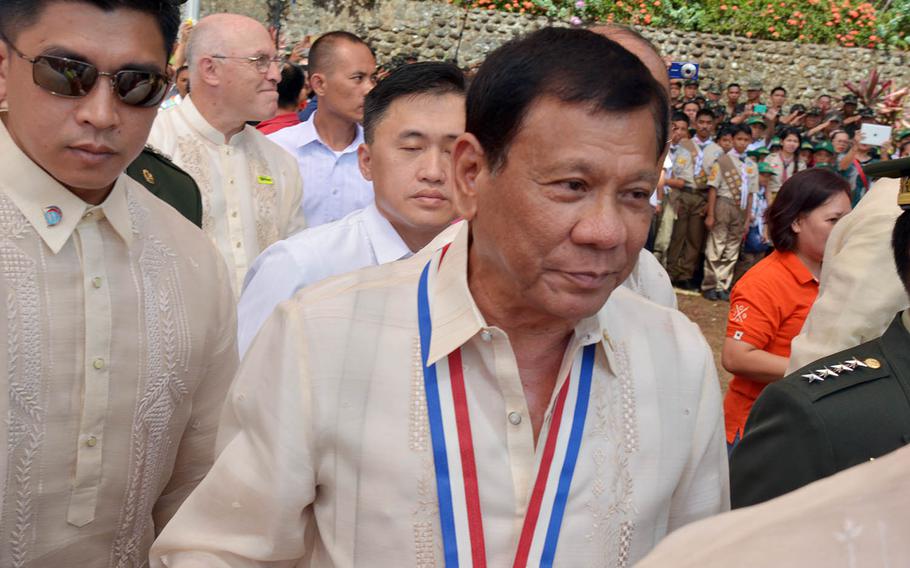
Philippines President Rodrigo Duterte arrives at Mount Samat to commemorate the 75th anniversary of the fall of the Bataan Peninsula to Japanese forces during World War II, April 9, 2017. (Seth Robson/Stars and Stripes)
A new U.S. administration under President-elect Joe Biden will tread carefully in its dealings with Philippines strongman President Rodrigo Duterte, defense experts predict.
Relations between the longtime allies went through a rough patch after Duterte took office in June 2016 and launched a sweeping anti-drug crusade that has included thousands of extrajudicial killings of drug dealers and users.
When U.S. officials criticized the drug war, Duterte responded by calling President Barack Obama a “son of a whore” and vowing to seek closer ties with China and Russia. He also cut bilateral military training and called for the departure of U.S. Special Forces from his country.
Relations have warmed during President Donald Trump’s time in office, but it hasn’t been a smooth road.
In January, Duterte threatened to terminate the Visiting Forces Agreement that governs American military training in the country over the denial of a U.S. visa to a former police chief who orchestrated the drug war. This week, Duterte extended the agreement for another six months.
Officials will seek to avoid more drama after Biden takes office, according to Jay Batongbacal, director of the University of the Philippines’ Institute for Maritime Affairs and Law of the Sea.
“I think they will treat Duterte rather gingerly,” he told members of the Foreign Correspondents Association of the Philippines during a Tuesday video conference. “They will know [Duterte] has certain eccentricities and a tendency for impulsive decisions and reactions.”
However, there will still be pressure over human rights in the Philippines during the Biden administration, according to Carlyle Alan Thayer, an emeritus professor at the University of New South Wales and lecturer at the Australian Defence Force Academy.
“Human rights will be an issue,” he said during Tuesday’s video conference. “If it’s just members of Congress and the State Department doing it in a diplomatic fashion, that might not trigger a Duterte counter-reaction.”
It will be important for Biden and Duterte to meet to establish common ground, something that might happen on the sidelines of some international forum, Thayer said.
“There is no baggage that Biden carries that Duterte should be worried about,” he said, adding that the new administration should be careful not to close off options for dealing with the Philippines.
“There is a way of raising these human rights issues … you don’t have to shout from the rooftop … (or) use megaphone diplomacy,” he said.
Relations between the Pacific allies have improved since the U.S. helped Philippine forces overcome Islamic State militants in the Battle of Marawi on the southern island of Mindanao in 2017. That could be built upon during a Biden administration, Thayer said.
Partners since 1951 in a Mutual Defense Treaty, the two nations share an interest in freedom of navigation in the South China Sea, where China has occupied territory claimed by the Philippines.
The next U.S. ambassador to the Philippines will be key to keeping the relationship on track, Patricio Abinales, a Philippines expert at the University of Hawaii, said in an email Wednesday.
“Duterte was ranting about the US a lot until the arrival of Ambassador [Sung Kim],” he said of the Obama appointee, who served in Manila for most of the Trump administration but departed for a new job as ambassador to Indonesia last month.
Kim’s quiet approach and focus on nurturing business ties and helping local forces fight Islamic terrorism ahead of flashy military drills such as the annual Balikatan exercise was effective, Abinales said.
“If the next ambassador is someone like Kim, then the relationship will be fine,” he said.
robson.seth@stripes.com Twitter: @SethRobson1